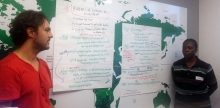NGO Consortium discusses strategy to fight privatization in education

The week of discussions, presentations and strategic planning examined the participating organisations’ work on fighting privatization of education, Public-Private Partnerships (PPPs) and the use of development aid for funding of for-profit actors in the education sector in Africa and elsewhere. The leading forces in this consortium are Education International, Action Aid, Global Initiative for Economic, Social and Cultural Rights, Global Campaign for Education and Open Society Foundation, with the support of Oxfam, Amnesty International, PSI and others.
The group expressed a desire to cooperate more closely, including building on the United Nations’ Sustainable Development Goals/Financing for Development work, to strengthen the alternative narrative to privatization and PPPs, with a strong link to tax justice and Quality Public Services. Participants recognized that the group could learn a lot from the fight against water privatization and apply it to the education sector, especially with respect to formulating strategies and building broad-based coalitions to challenge the handful of multinational firms that drive the privatization process and that obtain strong support from the World Bank Group and multilateral regional development banks. Over the next two years, the Consortium plans to develop guiding principles on the privatization of education and human rights, looking at how privatization infringes upon the human right to education.
A special report was released at the meeting that reveals how the United Kingdom’s Department for International Development (DFID) supports private actors in education and encourages the so-called low-fee for profit education in developing countries instead of supporting universal access to public education systems. The report expresses concern that the British government could be violating the human right to education with its financial and political support for the growth of private schools across Africa and South Asia. International and British organisations, as well as teachers’ unions, have joined campaigners from countries including Kenya, Uganda and Ghana to condemn the increased use of British aid money to support for-profit primary schools.
The report was also presented at a session of the UK Parliament.
Education International (EI) presented its campaign against the education company Pearson, which is currently active in nine countries.
The NGO Consortium is building its work in Ghana, Kenya, Uganda, Philippines, Pakistan, India, US, UK and Haiti. Other themes for discussion at the meetings were strategic litigation, use of international human rights complaint procedures and reporting, and the use of social media for campaigning.

